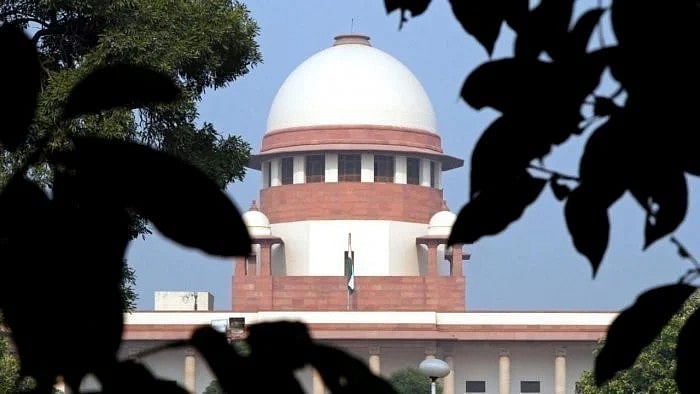
The Supreme Court of India.
Credit: PTI File Photo
New Delhi: The Supreme Court has said electronic communication is not a valid mode of service of notice under Section 35 of Bhartiya Nagrik Suraksha Sanhita, which allows the police to arrest a person without a warrant.
It held that the service of a notice under Section 35 of the BNSS, 2023 needs to be carried out in a manner that protects this substantive right, as non-compliance with the notice can have a drastic effect on the liberty of an individual.
A bench of Justices M M Sundresh and N Kotiswar Singh said the investigating agency is mandated to issue a written notice directing the person to appear before it, or at such other place as may be specified in the notice.
"We are unable to convince ourselves that electronic communication is a valid mode of service of notice under Section 35 of the BNSS, 2023, since its conscious omission is a clear manifestation of the legislative intent. Introducing a procedure into Section 35 of the BNSS, 2023, that has not been specifically provided for by the Legislature, would be violative of its intent," the bench said.
Senior advocate Sidharth Luthra, acting as amicus curiae, submitted that since a notice under Section 35 of the BNSS, 2023 is issued by the investigating agency, and its breach leads to arrest and deprivation of the liberty of an individual. It is appropriate that such a notice be served in person on the accused, and not through the mode of electronic communication, he added.
Concurring with the submission, the court pointed out the usage of electronic communication by the investigating agency, has only been provided for effecting the procedure under Sections 94 and 193 of the BNSS, 2023.
It noted Section 94 deals with issuance of summons, in an electronic form, to produce a document and Section 193 deals with the usage of electronic communication for forwarding the report to a Magistrate, upon completion of the investigation, or to inform the progress of the investigation to the informant or victim.
"None of these procedures have any bearing on the liberty of an individual," the bench said.
The court pointed out Section 35(6) BNSS provided that non-compliance with a notice does not ipso facto mandate arrest, as there lies a discretion with the investigating agency, which must be of the opinion that the arrest of the concerned person is necessary for the purpose of investigation.
"Failure to comply with the notice does not lead to automatic arrest. Rather, it is the last resort available to the investigating agency, after due exercise of discretion regarding the necessity of arrest," the bench said.
The court also said, while interpreting a statute, the legislative intent is to be gathered from a plain and simple reading of the language employed in the provisions, in a purposive manner, thereby upholding the objective behind the enactment.
In an application, the Haryana government contended that a notice under Section 35 of the BNSS, 2023 falls within the same category as a summons under Section 71 of the BNSS, 2023, and therefore, since the latter allows electronic mode of service, the former must also be permitted to be transmitted electronically.
The court, however, said the contention cannot be accepted, for the simple reason that a summons under Section 71 of the BNSS, 2023, has no immediate bearing on the liberty of an individual in case of its non-compliance.
"However, a notice under Section 35 of the BNSS, 2023 could have an immediate bearing on the liberty of the individual in case of its non-compliance, as laid down under Section 35(6) of the BNSS, 2023," the bench said.
The court also emphasised the essence of Article 21 of the Constitution imbues the BNSS, 2023, which reflects the laudable objective of safeguarding the liberty of an individual, while facilitating the investigation into and adjudication of offences.
"The restrictions on the usage of the mode of electronic communication, have been imposed in order to safeguard the right to life and personal liberty, guaranteed to an individual by the Constitution, from being impinged during the course of criminal investigation and proceedings," the bench said.
The court dismissed a plea by the Haryana government to modify the January 21, 2025 order which held that service of notice by the police to the accused through WhatsApp or other electronic modes cannot be considered or recognised.
The court had then directed all the States and the Union Territories to issue a standing order to their respective police machinery to issue notices under Section 41-A of CrPC, 1973 or Section 35 of BNSS, 2023 only through the mode of service as prescribed under the law.
